
Switzerland - Rhätische Bahn RhB
For a full scale picture, please click on the picture shown !

RhB or Rhätische Bahn or Viafier retica, Ferrovia retica, the railroad of Kanton Grischona (Graubünden) is Europe´s biggest
network of narrow gauge railroads. The base network is 376 km long, electrified with 11 kV AC, 16,7 Hz and has a gauge width
of 1 metre. It was opened for traffic 1889. In addition to the basic network RhB has also other, smaller networks: the
Berninabahn, also 1 metre wide, but electrified with 1 kV DC, the Chur-Arosa line (1 metre, earlier 2 kV DC, now converted to 11kV AC)
and also a minor line from Bellinzona (1 metre, 1,5 kV DC). RhB has about 60 locomotives and numerous EMUs and it operates some
of the most famous mountain railroads of the world. Names like Glacier Express or Bernina Express have been widely known for
decades and also the newer "Rollende Landstrasse" through-the-mountains service of the Vereina tunnel line has rapidly gained
popularity and fame.
This is one of the most modern train compositions of the Rhätische Bahn. This fixed set of coaches is called ALVRA. It's a permanently
coupled set of coaches which is always led by either a Ge 4/4 III locomotive or an Allegra EMU ABe 8/12 at the other end. At the end
shown here is always a permanently coupled new steering cab coach which very much looks like the Allegra trains. Both these new wagon-sets
as well as the fairly new Allegra electric multiple units are made by Stadler.
Picture from Landquart 4.7.2019 by Ilkka Siissalo.
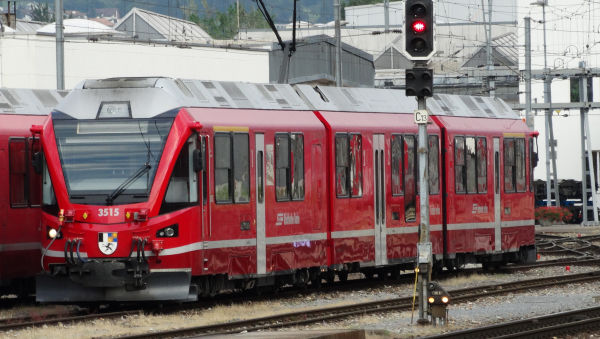
This train is the famous Allegra or ABe 8/12. It is a Stadler-built EMU which can run both on 11 kV 16.7 Hz, as well as on the Bernina Railway,
which is electrified at 1,000 V DC. They are used on the Chur to Arosa line, the Landquart to Davos line and on the Bernina railway. It was
the first truly modern EMU train of the RhB railway system built in the 2000s. 15 trains were built.
Picture from Landquart 4.7.2019 by Ilkka Siissalo.

Another Allegra unit no. 3101 ready to leave towards Rhäzüns. Note that this Allegra unit is four coaches long. Some others are just three coaches
long trains.
Picture from Landquart in the morning of 5.7.2019 by Ilkka Siissalo.

Almost the same place, almost the same train, but not quite. This is the Allegra unit no.3103 photographed at almost the same spot as the
3101 shown above.
Picture from Landquart in the morning of 5.7.2019 by Ilkka Siissalo.
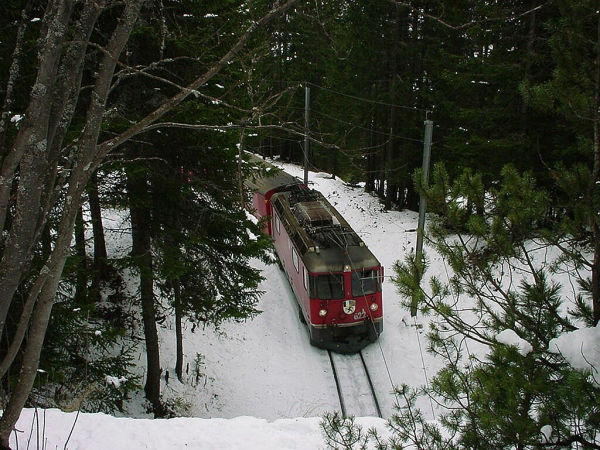
This train is from the Chur to Arosa line and it is here approaching the village of Arosa high up on the mountains. I was walking
with my dog and taking pictures of the dog playing in the fresh snow in the forests
along a small path as I suddenly heard the noice of an approaching train and managed to press the shutter at the right time.
The locomotive is a Ge 4/4 II series no. 622, built in 1984. These Ge 4/4 II´s are the narrow gauge equivalents of the state
SBB´s famous Re 4/4 II, built in 1973 and again in 1984. It´s very similar to the Re 4/4, except for a slightly smaller size,
and the fact that the Ge 4/4 is already based on modern thyristor driven AC motor technology which the SBB counterpart is not.
The engine is 12,96 m long, weighs 50 tons and has a maximum speed of 90 km/h, although at these steep mountain lines speeds in
practise rarely exceed 25 km/h. RhB bought 23 of these engines.
Picture from Arosa in April 2000 by Ilkka Siissalo.
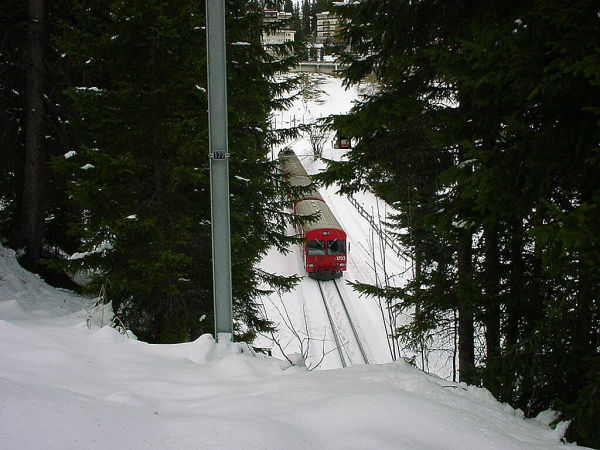
Second view of the train as it has left the small tunnel and approaches Arosa station. Behind the Ge 4/4 II locomotive there were
3 coaches, the last of which is a steering cab coach, no. 1702.
Picture from Arosa in April 2000 by Ilkka Siissalo.
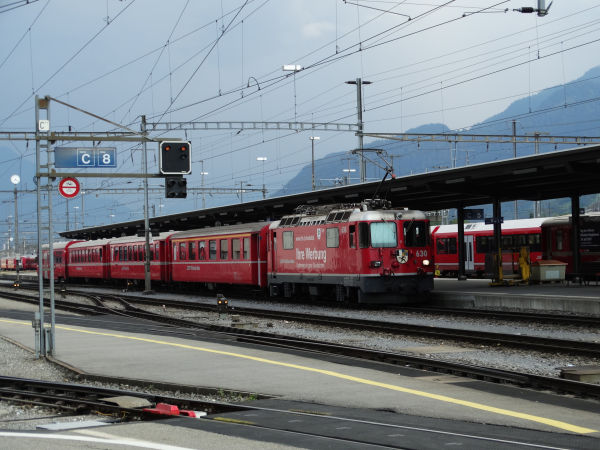
A very typical, although now already old-fashioned Rhätische Bahn express train composition with an Re 4/4 II locomotive, some express train
coaches and a steering cab coach wagon as the last one. These have been the backbone of the service for a long time. But they are now
gradually being displaced by newer multiple units such as the Allegra.
Picture from Landquart 4.7.2019 by Ilkka Siissalo.
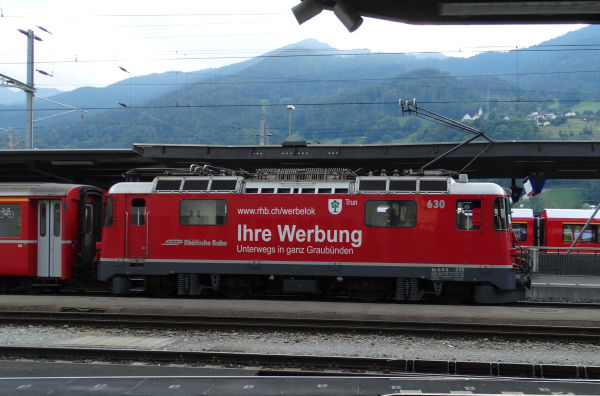
The same Ge 4/4 II locomotive as above, but seen closer by. The text is trying to get you to advertise here on the locomotive. We all hope
you never will :-)
Picture from Landquart 4.7.2019 by Ilkka Siissalo.
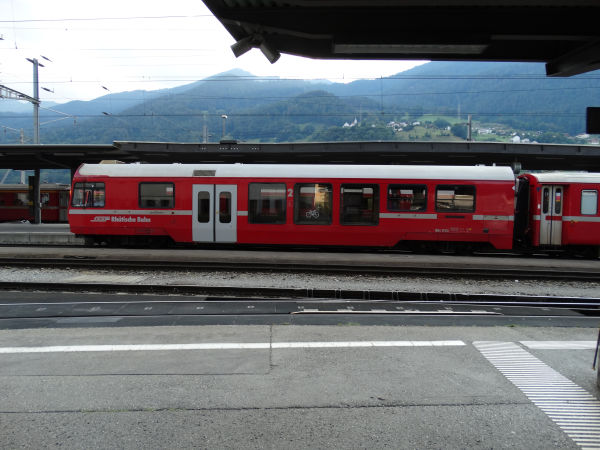
This steering cab coach at the other end of the same train as shown above is a very modern one, with a low-floor compartment, It is
registered as the BDt 1753. This one is from the year 1999 and the basic structure is from Stadler Rail.
Picture from Landquart 4.7.2019 by Ilkka Siissalo.
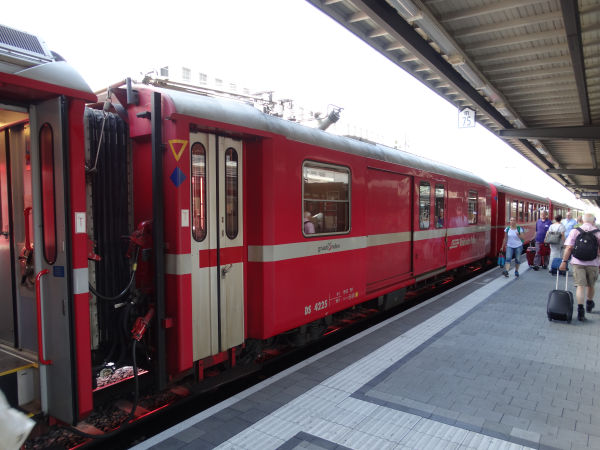
A very traditional - or let's say old-fashioned - postal and cargo coach DS 4225 is here a part of an InterRegio service of RhB from
Chur to St. Moritz.
Picture from Chur station 5.7.2019 by Ilkka Siissalo.
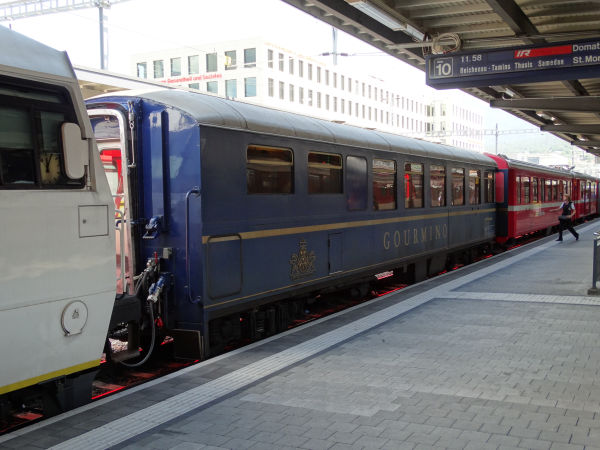
This very exclusive Gourmino restaurant wagon was also part of the same 11.58 service from Chur to St.Moritz as shown above.
Picture from Chur station 5.7.2019 by Ilkka Siissalo.
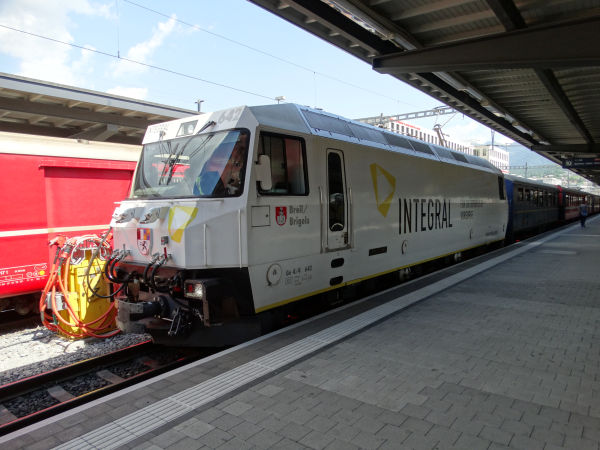
This Ge 4/4 III generation locomotive was leading the same InterRegio train from Chur to St.Moritz where the two coach pictures shown
above were from.
Picture from Chur station 5.7.2019 by Ilkka Siissalo.
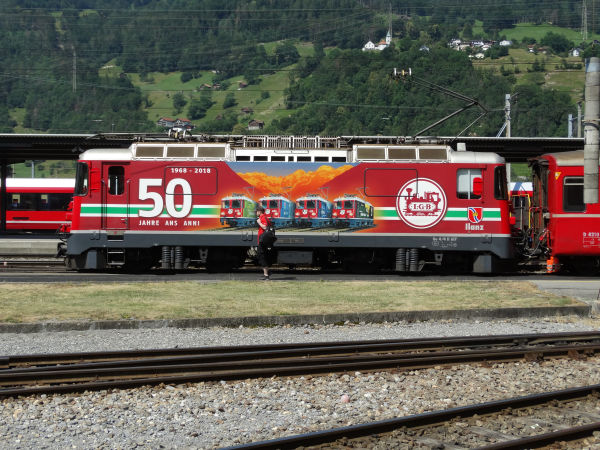
Another one of the Ge 4/4 II locomotives, this no.617 is carrying advertisement tapings of the model train manufacturer LGB. It is typical
of some model train makers that they like to pay for the taping of one or the other locomotive in their own special tapings and then they
make a model of it and sell it in hundreds of copies. And typically the buyers are people who already have that same locomotive - but not
yet precisely in the same special colours. This one is advertising LGB's four model trains of the same type Ge 4/4 II which LGB has made
during its 50 years of operation.
Picture from Landquart 5.7.2019 by Ilkka Siissalo.
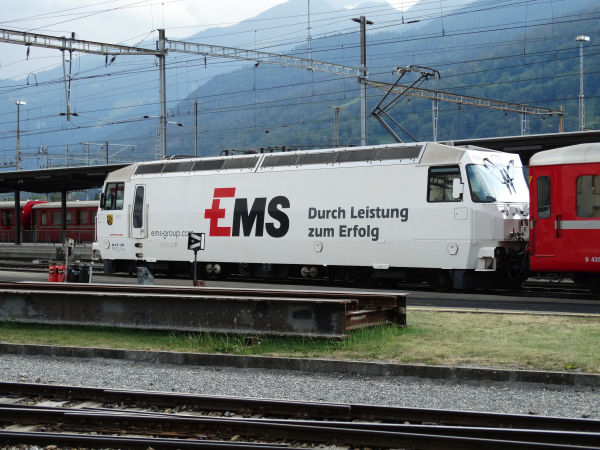
One of Rhätische Bahn's newest and best electric locomotives, the Ge 4/4 III no.643 named after the town of Vals is in fully covering
advertisement tapings, as most of them are. This one advertises for the EMS group, a company working in the field of polymers and specialty chemicals.
Picture from Landquart 4.7.2019 by Ilkka Siissalo.
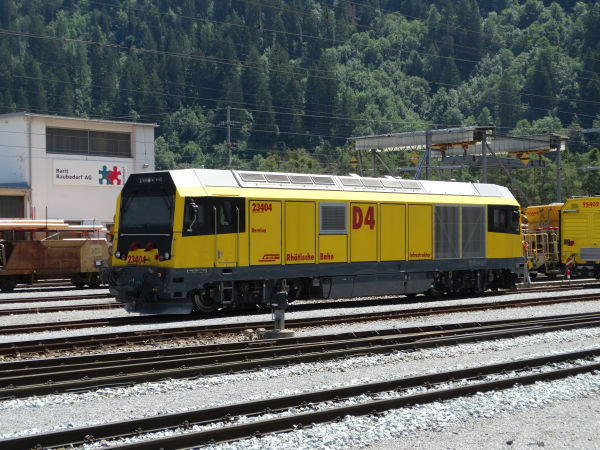
The locomotive number 23404 is one of Rhätische Bahn's newest locomotives. These strong diesel locomotives were ordered from the company Schalker Eisenhütte
in 2009 and taken into use in 2014. They are of the class Gmf 4/4 II. There are four of them in total. It is a four-axle metre gauge main line locomotive
weighing 64 tons and with a maximum speed of 100 km/h and a power rating of 1800 kW. They have diesel engines of the type 12V 4000 R43L of MTU Friedrichshafen
and they are capable of working even at 70 promille steep slopes with their dieselelectric transmission systems. They are used in front of really heavy maintenance
and ballast trains and also during winter time with snow ploughs or rotary ploughs.
Picture from the station of Thusis 5.7.2019 by Ilkka Siissalo.

The same main line diesel locomotive Gmf 4/4 II no.23404 as shown above, but here seen from the other side.
Picture from the station of Thusis 5.7.2019 by Ilkka Siissalo.
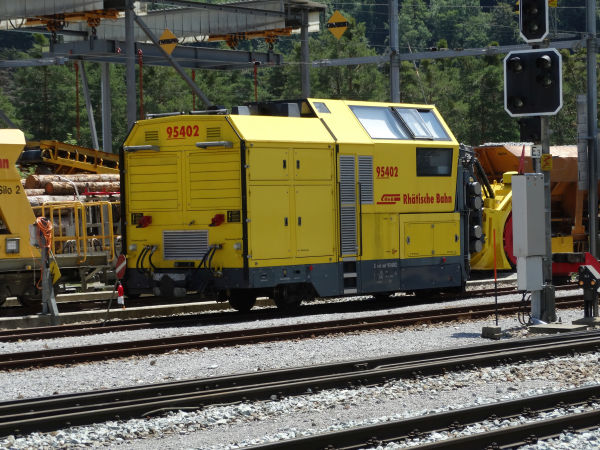
The very modern rotary snow plough Xrot mt 95402 is designed to work together with the new and strong diesel locomotive Gmf 4/4 II shown above.
Picture from the station of Thusis 5.7.2019 by Ilkka Siissalo.
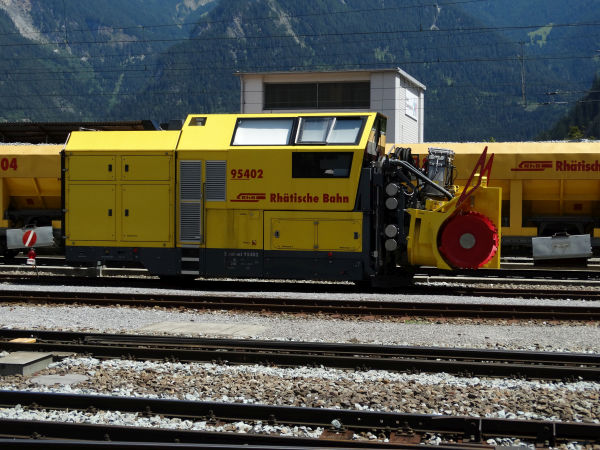
The same rotary snow plough Xrot mt 95402 as above, but here seen from its side. This rotary plough was built by the company Zaugg in 2012. It is today
one of the most effective rotary snow removal engines in the whole of Switzerland.
Picture from the station of Thusis 5.7.2019 by Ilkka Siissalo.
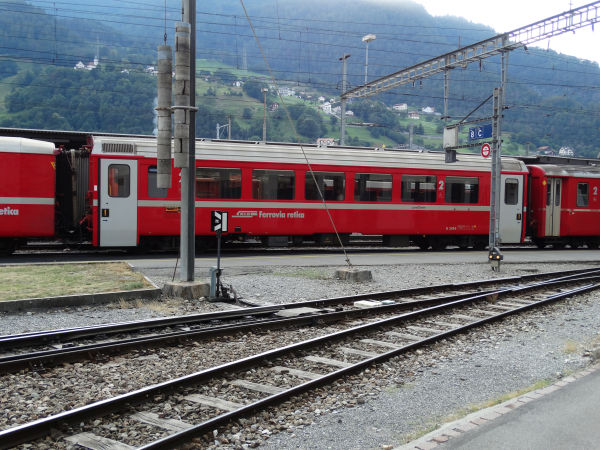
A typical modern Rhätische Bahn express train coach, the B 2494. This design was created for the Berninabahn although the wagons have been used elsewhere
as well, just like here. This precise wagon has been the model for several model train coaches of the scales G and H0e.
Picture from Landquart 4.7.2019 by Ilkka Siissalo.
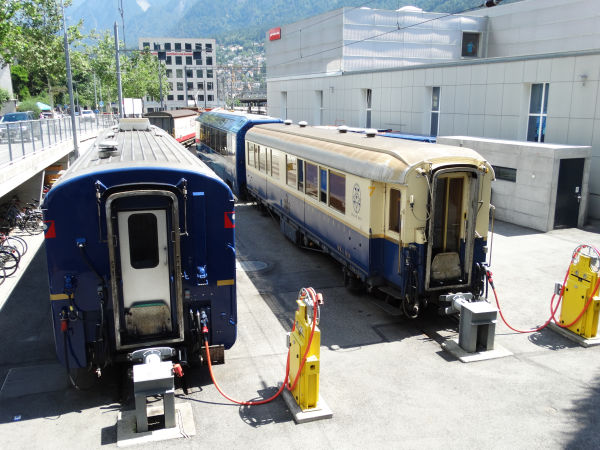
Several different Rhätische Bahn restaurant coaches of various ages parked at a siding where they have constant uninterrupted electricity
available so that their freezers and fridges do not melt.
Picture from a siding at the Chur station 5.7.2019 by Ilkka Siissalo.
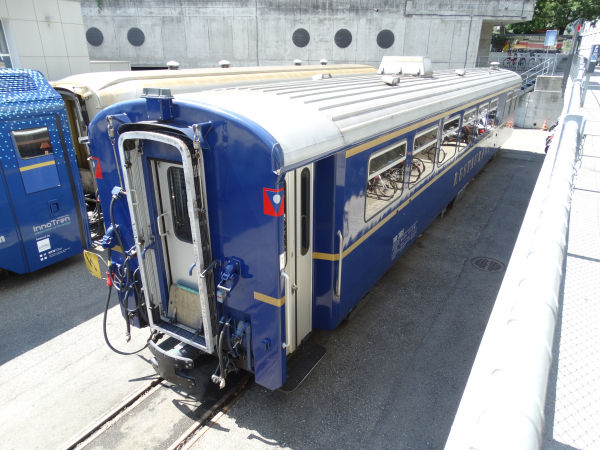
This restaurant wagon fits the style of the 1960s-1970s Chur to Arosa trains' typical coaches.
Picture from a siding at the Chur station 5.7.2019 by Ilkka Siissalo.

...and this Stadler made "InnoTren" is for sure the newest that Rhätische Bahn can offer when it comes to restaurant coaches.
Picture from a siding at the Chur station 5.7.2019 by Ilkka Siissalo.
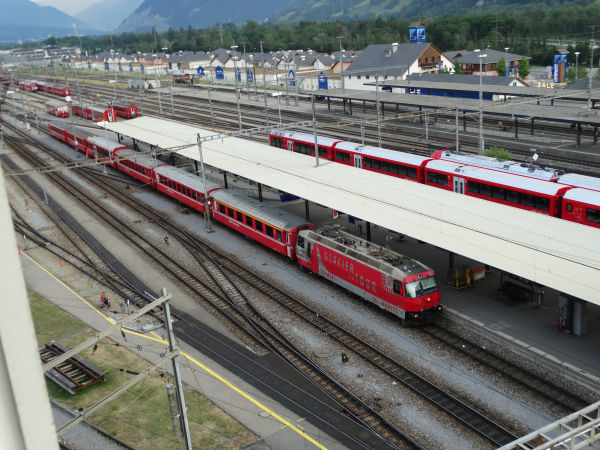
This is still in 2019 a very typical RhB express train running from Landquart to Zermatt, but in the near future this might become a rarity
as EMU type trains are pushing these traditional locomotive + coaches type of trains out of service. Here we have an Ge 4/4 III locomotive with
a long rake of older wagons arriving at Landquart in the evening of 4.7.2019.
Picture from Landquart 4.7.2019 by Ilkka Siissalo.
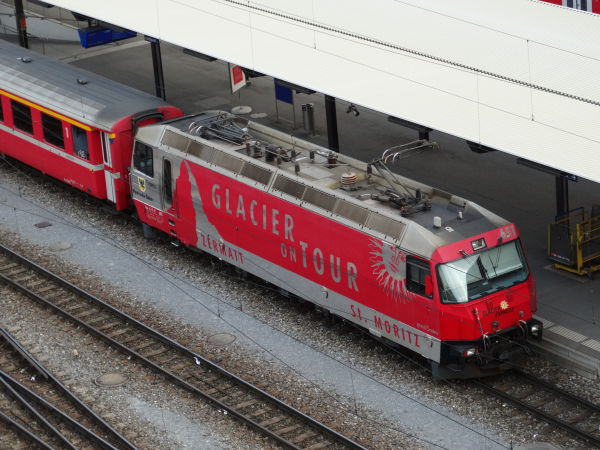
Another view of the same Ge 4/4 III locomotive as shown above.
Picture from Landquart 4.7.2019 by Ilkka Siissalo.
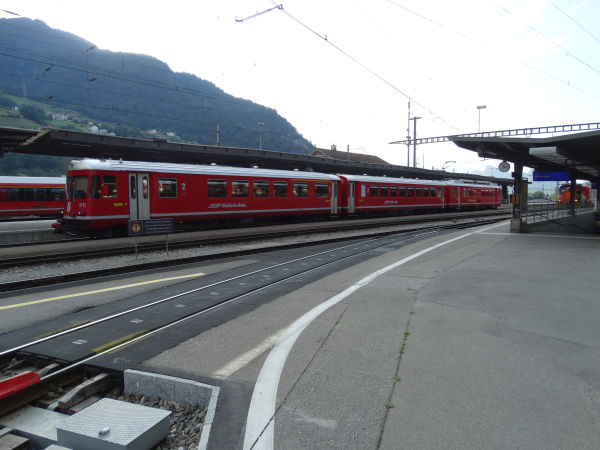
This is a classic flatland short-distance train of Rhätische Bahn. The motor wagon on the right is the Be 4/4 no 512. These motor wagons have always been
used as a combination with three or four wagons, a steering cab coach last. Here the steering cab coach was the no.1711. These Be 4/4 motor wagons were built by
FFA, SIG, and SAAS in 1971 and again in 1979 and there were six of these trains, with the motor wagons numbered 511 to 516. It is a 90 km/h fast EMU combination
mainly intended for the suburban commuter traffic around the city of Chur. These trains are technically remarcable as they are Switzerland's first thyristor
controlled electric multiple units. They are also fitted with automatic Scharfenberg couplings, which is not the normal case for RhB trains. These are
now being phased out and scrapped in 2019.
Picture from Landquart 4.7.2019 by Ilkka Siissalo.
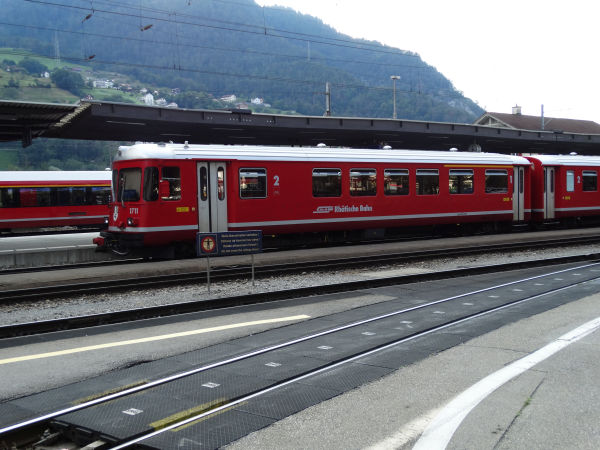
A closer view of the steering cab coach no.1711 which belonged to the same train as described above. The front of these coaches was designed to match the
nice looking face of the Re 4/4 / RhB Ge 4/4 locomotives, see above.
Picture from Landquart 4.7.2019 by Ilkka Siissalo.
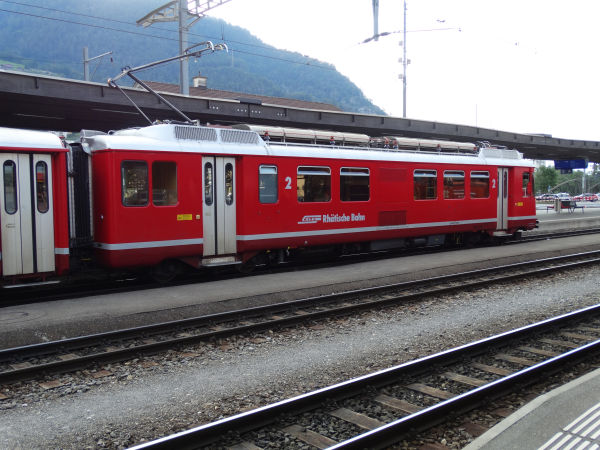
A closer view of the Be 4/4 no. 512 motor wagon of the train described above.
Picture from Landquart 4.7.2019 by Ilkka Siissalo.
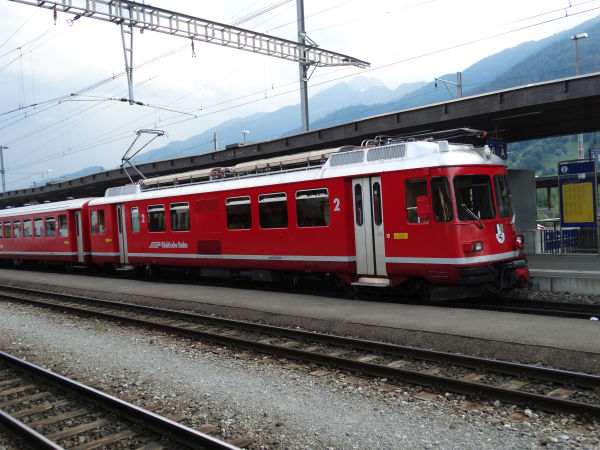
The design of the Be 4/4 no.512 motor wagon is already from the 1960s but nevertheless it looks very modern. It also very much looks the same as the
Swiss state federal railways SBB's "Mirage" trains which were the most top modern trains in the late 1960s and which were used in the commuter traffic of Zürich.
Picture from Landquart 4.7.2019 by Ilkka Siissalo.
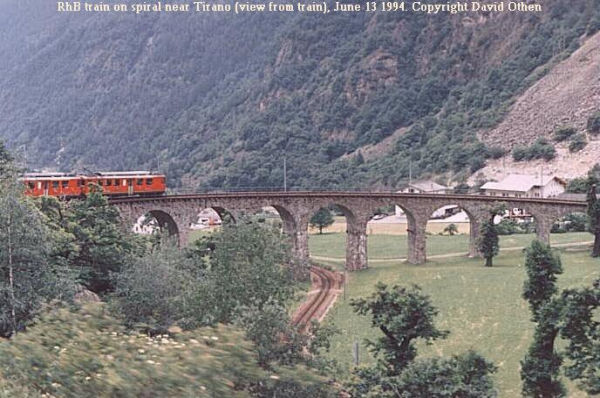
Rhaetian Railways (Rhätische Bahn) EMU units heading a Bernina Express train around the Brusio spiral near Tirano on the Swiss side of
the border with Italy, 13 June 1994.
Photo taken from train by Pat & David Othen.
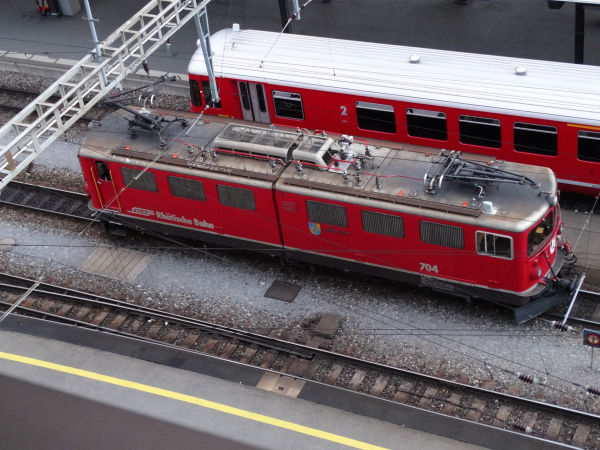
Rhätische Bahn locomotive type Ge 6/6 II is already old and it is a rarity to see one. The last ones are being pushed out of service as
we speak. It is/was a six axle machine which was able to bend in the middle. They were built 1958 and again in 1965 by a consortium of SLM, BBC
and MFO. Seven machines were made and at the time when this picture was taken, only two remained. It is a BoBoBo (2 + 2 + 2 axles) locomotive
with a very modest power otput of only 1,776 kW and a top speed of 80 km/h. The last two ones have been used mainly in goods traffic and this picture
of a machine which just had left a passenger train is an absolute rarity in 2019.
Picture from Landquart 4.7.2019 by Ilkka Siissalo.
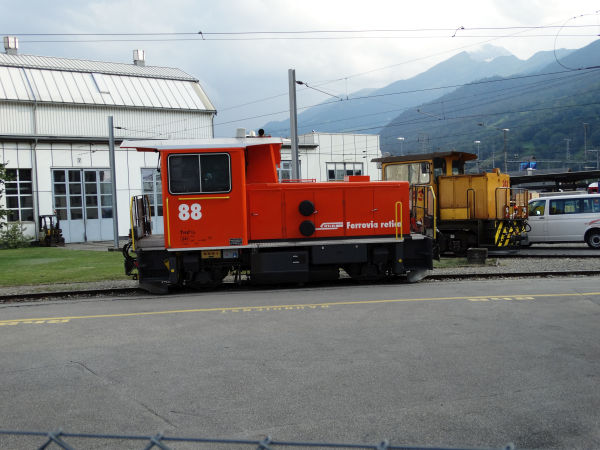
Rhätische Bahn's small switcher Tmf 2/2 no.88 is intended for swicther work at RhB's main maintenance works at Landquart. In the background
another, older switcher diesel.
Picture from Landquart 4.7.2019 by Ilkka Siissalo.
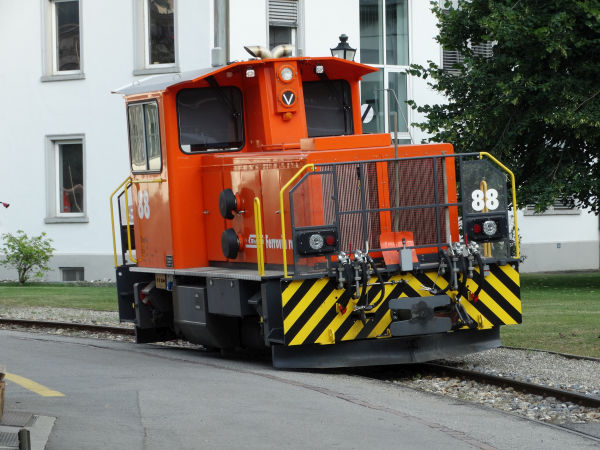
The same switcher Tmf 2/2 no.88 seen more from its front.
Picture from Landquart 4.7.2019 by Ilkka Siissalo.
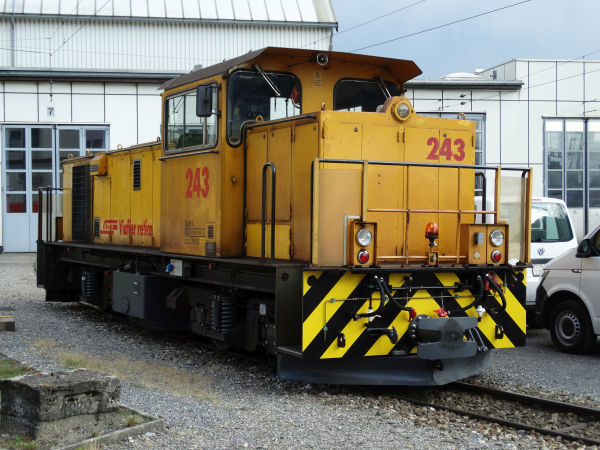
Gmf 4/4 no.243 is a dieselhydraulic switcher locomotive of the Rhätische Bahn. There are two of them, 242 and 243, and they are from the year 1991.
They were built by Kaelble-Gmeinder and they were intended for the building of the very long Vereina tunnel. These machines brought the smashed rocks
out of the tunnel. After the tunnel has been finished, one of them is on standby close to the Vereina tunnel with an emergency train ready to help in
case of an emergency and the other one is helping with various track renewal projects elsewhere.
Picture from Landquart 4.7.2019 by Ilkka Siissalo.
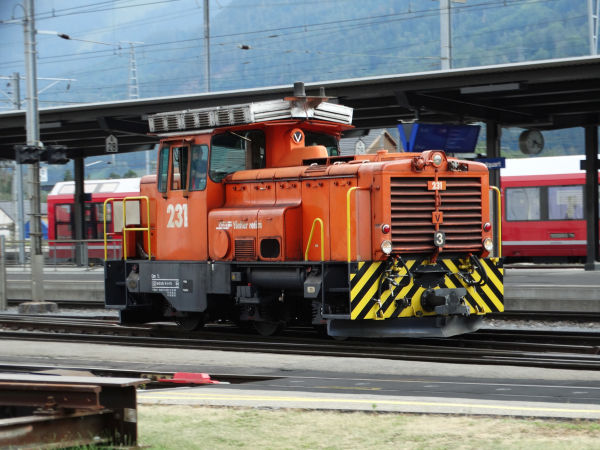
Rhätische Bahn Gm 3/3 no.231 is a three-axle shunter diesel of RhB. There were three of them with numbers 231-233 built in 1975-76 by Moyse. It has a very modest
power rating of only 386 kW with its MTU 6V 33 1 TC10 diesel engine. Top speed is 55 km/h. They are purely intended for the heavy switching work at the three
busiest cargo stations of RhB Landquart, Chur and Untervaz.
Picture from Landquart 4.7.2019 by Ilkka Siissalo.
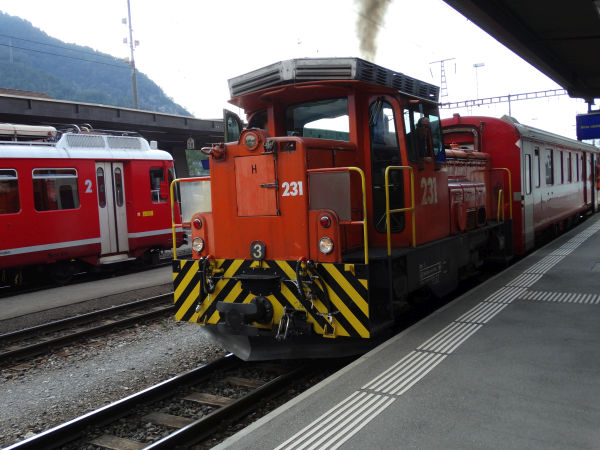
The same RhB Gm 3/3 231 as above is here fetching a steering cab coach from the platform and is causing quite a plume of smoke when accelerating.
Picture from Landquart 4.7.2019 by Ilkka Siissalo.
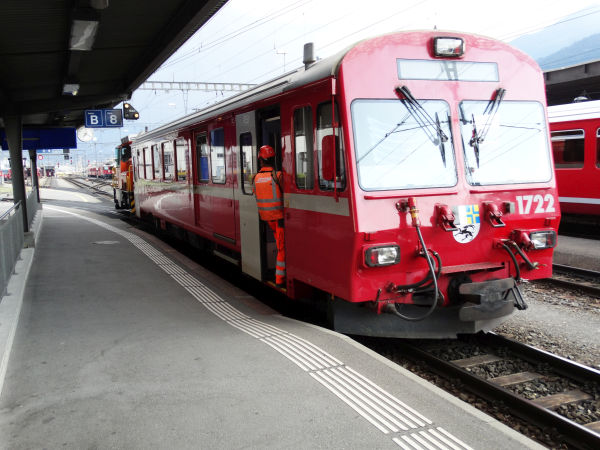
Continuation to the picture shown above... The steering cab coach no.1722 which the shunter Gm 3/3 231 was fetching is one of the most modern steering
wagons of RhB. It is mainly used in the Chur area commuter services.
Picture from Landquart 4.7.2019 by Ilkka Siissalo.
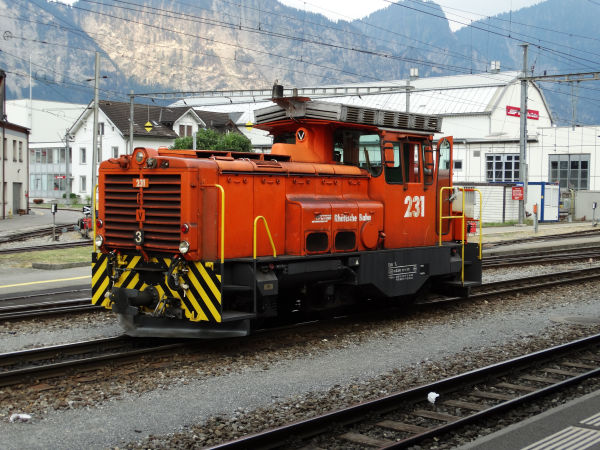
Still the same RhB Gm 3/3 231 as above.
Picture from Landquart 4.7.2019 by Ilkka Siissalo.
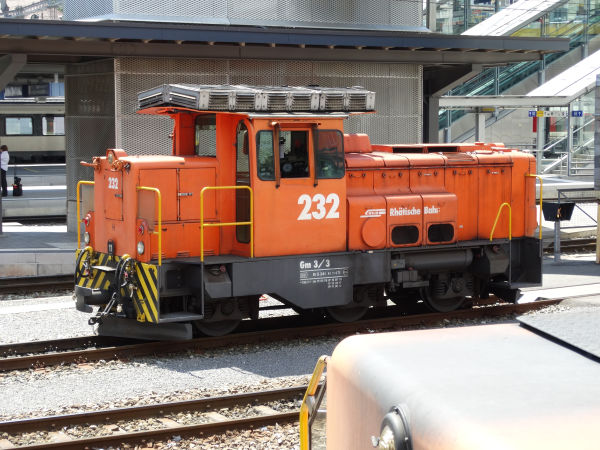
The similar Gm 3/3 no.232 was waiting for new tasks at the Chur station.
Picture from Chur 5.7.2019 by Ilkka Siissalo.
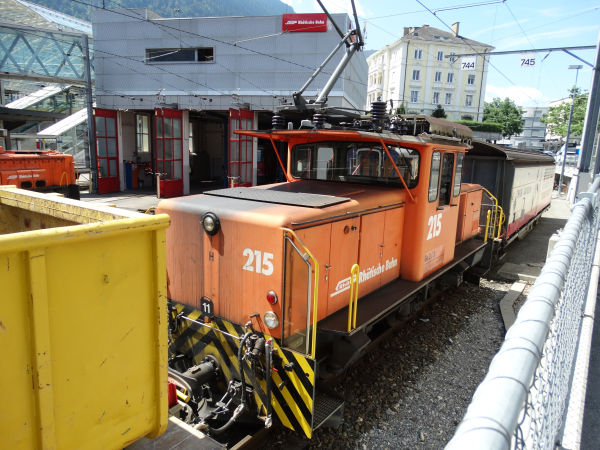
The small electric shunter locomotive Ge 3/3 no.215 was built by Robert Aebi (Raco) and BBC in 1984. There are only two of these
locomotives. No.214 is normally in Samedan and 215 in Chur.
Picture from Chur 5.7.2019 by Ilkka Siissalo.
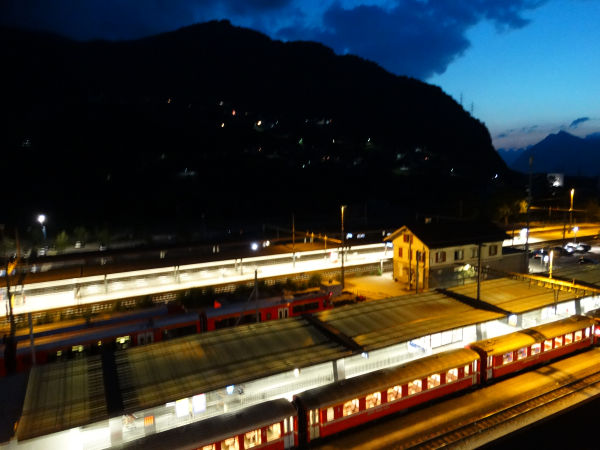
Landquart station during nighttime and seen from a hotel room just next to it. In the front an old-fashioned RhB express train from
Davos and in the track behind a more modern Allegra EMU..
Picture from Landquart 4.7.2019 by Ilkka Siissalo.

You can't see it properly, no. Sorry. But we, the editors, did not see it any better, it was well hidden. This is the future short distance commuter train
of Rhätische Bahn, built by Stadler and named Capricorn. These will in the future be replacing the old 1960s EMUs that you can see on this
same page higher up.
Here is a link to the "Bahnonline.ch" which wrote an article of the official roll-out of this new train type. Sorry, it's in German.
Picture from Landquart 5.7.2019 by Ilkka Siissalo.
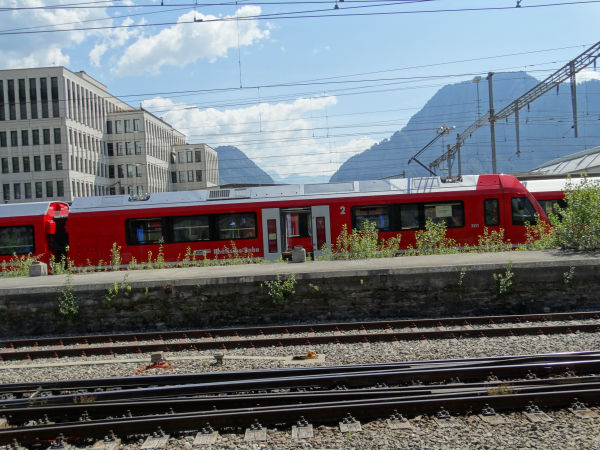
Another sneak-peek at the same brand new, but not yet in use being Stadler Capricorn no.3111 as shown above.
Picture from Landquart 5.7.2019 by Ilkka Siissalo.
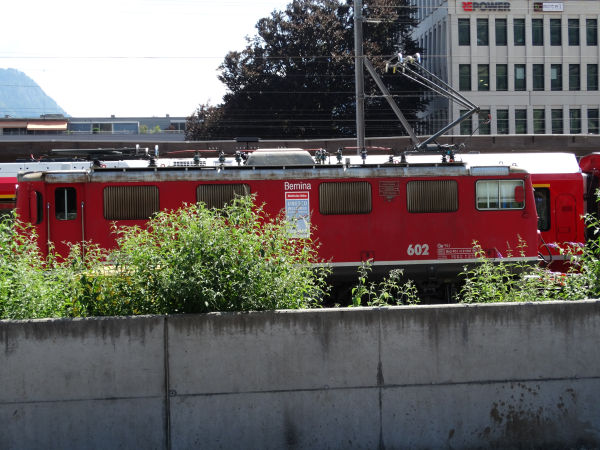
Sorry that also this picture is taken from through the bushes, but we were lucky to see even this much. This locomotive is the Ge 4/4 I no.602.
These machines were built in 1947 and the last ones in 1953 and they have already for a long time been supposed to be dead and scrapped, but still one
or two machines seemed miraculously to have lived over to the year 2019 and this is one. Ten machines were made and their scrapping has been
going on already since 2010. It is an 80 km/h fast four-axle locomotive. This one, no.602 "Bernina" is now the property of the Swiss transport museum
"Verkehrshaus" from Luzern since already 2012, but to our big surprise, there it still stood at the Landquart station, but well hidden.
Picture from Landquart 5.7.2019 by Ilkka Siissalo.
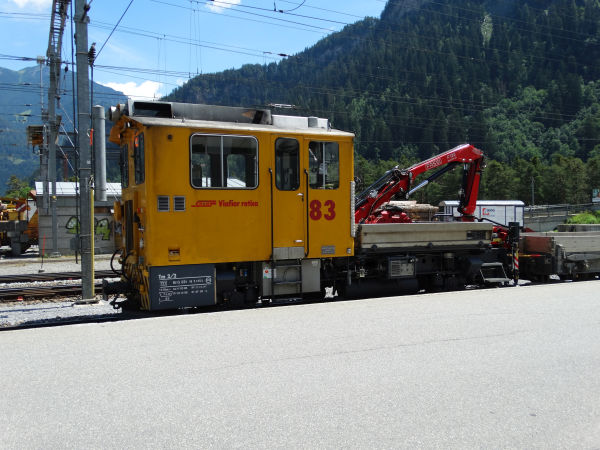
A Rhätische Bahn rail truck of the class Tm 2/2 no.83. This is a metre gauge machine built by the company Robert Aebi. This one was built in 1985 and
it is permanently stationed at Thusis.
Picture from the station of Thusis 5.7.2019 by Ilkka Siissalo.

